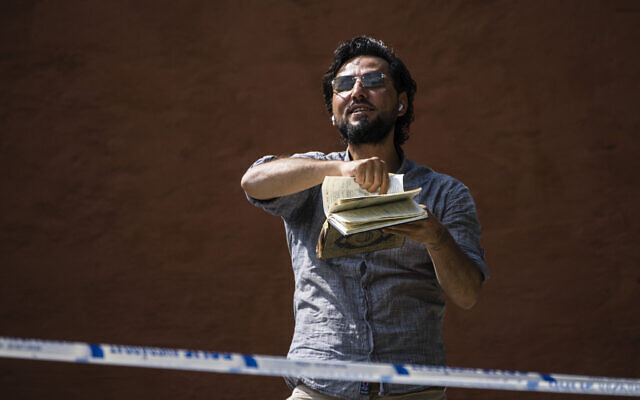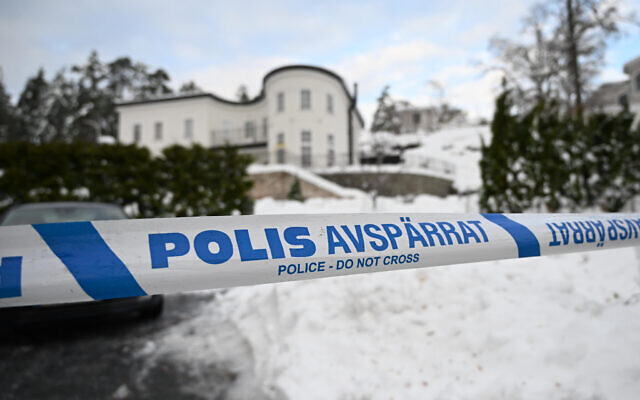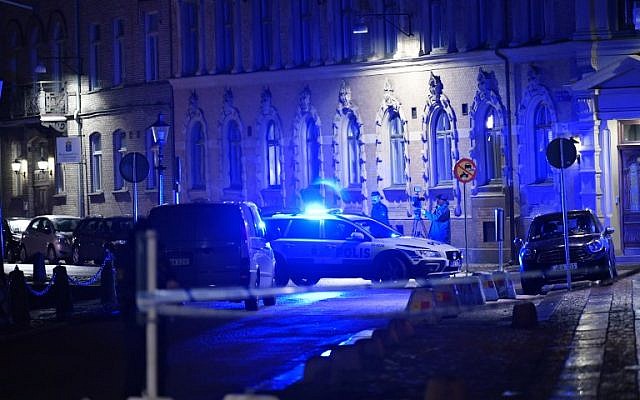Sweden has witnessed a holy book-burning saga that left many feeling uneasy about the effects of immigration on religion in the Scandinavian country, and in Europe more widely.
The European Jewish Congress was “shocked and appalled” by the plan of a Syria-born Muslim resident of Sweden to burn a copy of the Torah and the Christian Bible outside the Israeli embassy in Stockholm on Saturday. It was supposed to be in protest of the burning of a copy of the Quran outside a mosque in the Swedish capital last month by an Iraqi immigrant.
The Syrian protester, identified as Ahmad Alush, 32, did not go through with the exercise and said he’d never intended to. “It is against the Quran to burn and I will not burn. No one should do that,” Alush told reporters on Saturday.
“This is a response to the people who burn the Quran. I want to show that freedom of expression has limits that must be taken into account,” he said.
Widespread media coverage of these events, and their permissibility under Swedish law, has “hurt Sweden’s image abroad,” according to Aron Verständig, the president of the Council of Swedish Jewish Communities.
Yet to Verständig and many Swedish Jews, the scandals were a testament to the robustness of coexistence in Sweden rather than a display of its breakdown.
“Unfortunately, we’re discussing the burning of scripture in Sweden, but the discussion has had some positive outcomes,” Verständig told The Times of Israel on Sunday.
Behind the scenes, leaders of Muslim faith communities who vocally opposed Alush’s plan to burn a copy of Jewish or Christian scripture had convinced him to drop it, Verständig said.

Salwan Momika holds up a Quran before setting some pages on fire in a protest outside a mosque in Stockholm on June 28, 2023, during the Eid al-Adha holiday. (Jonathan Nackstrand/AFP)
“It says a lot of good things about Swedish society when you see that virtually no one supports the actions of a handful of extremists,” said Verständig.
“To read the news in Israel, there’s a narrative according to which Sweden is a place where they torch Torah scrolls and Swedish Jews are threatened and intimidated by this. We’re not. We condemned the Quran burning and the leaders of Muslim communities condemned the plan to burn the Bible, as did Christians. There’s solidarity and a recognition that even though something is legal, it’s still inappropriate and objectionable.”
Salwan Momika, an Iraqi Christian immigrant living in Sweden, burned a copy of the Quran in Stockholm last month, triggering condemnations and protests in several Middle Eastern countries. But subsequent plans by far-right activists in Sweden to recreate the scene did not materialize.
Alush, who had planned to torch what he called a “Torah” – a term that Verständig and others understand to mean a printed copy of the Hebrew Bible or New Testament, rather than a Torah scroll – said on Saturday that he had never meant to go through with the action, which he had announced in a bid to raise awareness.

A police tape cordons an area outside a house where Swedish Security Service conducted a raid in 2022. (Fredrik Sandberg/TT News Agency via AP)
“There’s a difference between freedom of expression and actions that are incitement against a group of people,” Sweden’s TV4 quoted Alush as saying. “I want this to lead to a ban on burning all holy books. You can criticize and you can think one way or another, but you shouldn’t burn,” he said.
Some members of Sweden’s Muslim minority have in the past targeted Jewish places of worship for attacks, sometimes in connection with Israel.
In 2017, shortly after former US president Donald Trump announced that his country would move its embassy to Jerusalem, three Muslim immigrants, including an asylum seeker from Gaza, hurled Molotov cocktails at a synagogue in Gothenburg when dozens of congregants were inside. The arson resulted in little damage but was nonetheless one of the most violent attacks on Swedish Jews in recent years.
Each year produces a steady stream of antisemitic crimes in Sweden, with 170 of them reported in 2020. That year, which is the subject of the most recent official breakdown, antisemitic attacks accounted for 5% of all hate crimes perpetrated in Sweden although Jews make up only 0.2% of the population. Anti-Muslim hate crimes comprised 9% of the total, matching the Muslim minority’s share of the population.

Police arrive after a synagogue was attacked in a failed arson attempt in Gothenburg, Sweden, late December 9, 2017. (AFP/TT News Agency/Adam IHSE)
Swedish Jewish communities have managed to flourish in Sweden despite extremism, but some congregations have had setbacks.
In Malmö, a southern city where a third of the population is believed to be Muslim, hundreds of Jews have left. Some believe the community has been halved over the past 20 years. And in the northern city of Umeå, harassment by neo-Nazis in 2018 led a local Jewish community leader to dissolve her association and cease its activities — a rare event in Europe.
In addition to radical Muslims, Sweden, which was nominally neutral during World War II, has an active neo-Nazi scene whose activists sometimes harass Jewish communities.
The Jewish community of Sweden has been in contact with Muslim community leaders in an attempt to address radicalism and antisemitism, Verständig said. “It’s been challenging because the Muslim community is very diverse so it’s difficult to speak to central leadership, but I think this has improved and we have an effective dialogue now,” Verständig said.
Both Momika, the Quran torcher, and Alush told authorities of their plans in advance and were assured that the actions they had envisioned were legal, they said.
That’s because the law in Sweden, as in many other countries, does not prohibit burning books.
The government is looking into legislation to change that, but the Council of Swedish Jewish Communities, an umbrella group that is the largest representative body of Sweden’s minority of about 20,000 Jews, is not advocating for any change.
“The recent book burning incident and rhetoric, while disturbing, show that Swedish society can deal with this without legislation, through debate. That’s the preferable outcome,” Verständig said.
"story" - Google News
July 17, 2023 at 05:14PM
https://ift.tt/48kfhM5
Swedish Jewish group sees silver lining behind scripture-burning story - The Times of Israel
"story" - Google News
https://ift.tt/JAKSbWz
https://ift.tt/NBSFkKh
Bagikan Berita Ini














0 Response to "Swedish Jewish group sees silver lining behind scripture-burning story - The Times of Israel"
Post a Comment